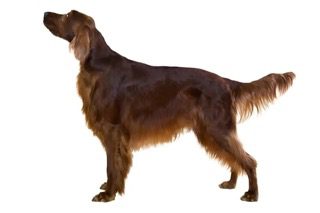
The Irish Setter is a hunting dog breed developed in Ireland in the 1800s. It was developed by crossing pointer dogs from Spain, Germany, and France with other local Irish breeds. Irish Setters have a muscular, medium-sized frame with a long, silky coat. They are known for their reddish coat, typically in shades of chestnut and mahogany, although they can also come in a variety of colors, including white or black and tan. Their main distinguishing feature is their feathering, which is longer around their faces and legs. They have dark, almond-shaped eyes, a long, thin muzzle, and long, drooping ears. They are considered an active and energetic breed and often used for hunting and retrieving. What truly sets Irish Setters apart from other breeds is their strong sense of companionship and loyalty, making them great all-purpose family pets.
The Irish Setter is a friendly and gentle breed that loves to be around its people. They are highly intelligent and love to play fetch and work on challenging tasks. They are very patient and tolerant but need firm, structured training from an early age to learn proper behaviors. Irish Setters do great with children and get along with other household pets, as long as their personalities mesh well. Since they are a high energy breed, Irish Setters need regular exercise and stimulation to stay happy and healthy. Long walks, running, and playtime in a large yard are ideal for this breed. They do best when kept as indoor pets due to their need for companionship and can become quite vocal if they are not properly engaged. They easily form strong bonds with their owners and are devoted companions.
The Irish Setter is a lively, intelligent breed that requires a balanced, nutritionally sound diet for proper growth and development. As they are an active breed, they need plenty of high-quality proteins, as well as other essential vitamins and minerals. Whole grains, fruits, vegetables, and limited amounts of healthy fats should also be included in their diet. They may need more grain-free or low-starch foods to prevent common digestive issues associated with high-starch diets. It’s important to keep an eye on their weight as Irish Setters can be prone to obesity if they’re not fed properly. Additionally, they need short, daily walks and some form of daily mental stimulation for keeping them healthy and happy.
Irish Setters are a highly energetic and active breed. They are prone to certain health issues such as hip dysplasia, hypothyroidism, and epilepsy. Regular veterinary check-ups, vaccinations, and preventive care are important to maintain their health and catch any health issues early. Grooming needs should include brushing, bathing, and ear cleaning. Also, ensure your Irish Setter is getting a balanced diet with regular exercise to help prevent obesity.
Their typical lifespan ranges from 10 to 12 years, although with good care, they can live longer. Factors such as genetics, diet, exercise, and healthcare can influence their longevity.
Responsible and informed dog ownership is important, and so is feeding the right food in accordance with the breed’s nutritional requirements. To do this, pet owners should consult with their vet to create an individual feeding plan for their Irish Setter. Checking out Way Canina is a great way to learn more about your Irish Setter and to find out what foods are and aren’t appropriate for them. With the right diet and care, you can ensure that your Irish Setter remains healthy and happy.
Are you a proud owner of an Irish Setter, or thinking of getting one? Owning any breed of dog is a big responsibility, so it’s important to consider the pros and cons of the breed you choose. If you’d like to learn more, visit Way Canina and check out our blog posts and articles about Irish Setter and other breeds: We cover important information related to their lifestyles and wellbeing.”